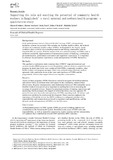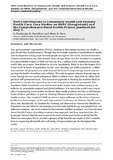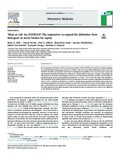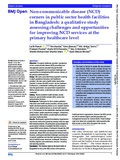Supporting the role and enabling the potential of community health workers in Bangladesh’s rural maternal and newborn health programs: A qualitative study
Citation
Adams, A. M., Vuckovic, M., Graul, E., Rashid, S. F., & Sarker, M. (2020). Supporting the role and enabling the potential of community health workers in Bangladesh’s rural maternal and newborn health programs: a qualitative study. Journal of Global Health Reports. doi:https://doi.org/10.29392/001c.12682Abstract
Background
In the global journey towards Universal Health Coverage (UHC), strong primary
healthcare systems are essential. This includes the frontline health workers, the bedrock
of which are community health workers (CHWs). In Bangladesh, this largely female
workforce plays a critical role in health promotion and linking communities with the
formal health care system. With the launch of the new national strategy on CHWs, and its
ambitions around the implementation of harmonized systems of financing, certification,
job harmonization, performance assessment and supportive supervision, it is important
to reference the perceptions, experiences, needs and aspirations of CHWs themselves.
Methods
This qualitative exploratory study examines three UNICEF supported maternal and
newborn health (MNH) programs in rural Bangladesh, with two districts sampled for each
program. In-depth interviews were conducted with CHWs, community members, other
health workers, and program managers. Data were analyzed using a thematic analysis
approach, with a particular focus on the voice and experience of CHWs and the
programmatic features that support them in serving their communities.
Results
Across all three programs, CHWs function as critical local agents for health promotion
and referral whose recruitment from and support by the community, enhances their
effectiveness. Regular communication and collaboration between CHWs and public-sector
frontline workers were perceived as important in enabling their role in increasing the
coverage of essential services. Support for structured systems of training, supervision and
monitoring which encompass the support of referral decisions, was also apparent. Of
particular note were the needs and aspirations of CHWs regarding work-life balance, job
satisfaction and desire for professional development. These concerns emphasize the
importance of flexibility in how the CHW workforce is configured such that roles,
responsibilities and remuneration are keyed to experience and qualifications, and the
dynamic needs and aspirations of CHWs over the life course.
Conclusions
As Bangladesh pursues its UHC agenda, CHWs are pivotal in linking underserved
communities to the formal health system. Flexibility in the scope of CHW roles and
responsibilities, as well as supportive supervision, regular training and fair remuneration,
will optimize their contributions towards UHC and better MNH outcomes.
Description
This article was published in Journal of Global Health Reports [ This is an open-access article distributed under the terms of the Creative Commons Attribution 4.0 International License (CCBY-4.0).] and the definite version is available at: https://doi.org/10.29392/001c.12682 The Journal's website is at: https://www.joghr.org/article/12682-supporting-the-role-and-enabling-the-potential-of-community-health-workers-in-bangladesh-s-rural-maternal-and-newborn-health-programs-a-qualitative-studyDepartment
Brac James P. Grant School of Public HealthType
Journal ArticleCollections
Related items
Showing items related by title, author, creator and subject.
-
NGO contributions to community health and primary health care: Case studies on BRAC (Bangladesh) and the Comprehensive Rural Health Project, Jamkhed (India)
Chowdhury, A. Mushtaque R.; Perry, Henry B. (Oxford University Press, 2020-04-30)Non-governmental organizations (NGOs) working in developing countries are chiefly a post-World War II phenomenon. Though they have made important contributions to health and development among impoverished people throughout ... -
‘Most at risk’ for COVID19? The imperative to expand the definition from biological to social factors for equity
Afifi, Rima A.; Novak, Nicole; Gilbert, Paul A.; Pauly, Bernadette; Abdulrahim, Sawsan; Rashid, Sabina Faiz; Ortegae, Fernando; Ferrand, Rashida A. (Elsevier, 2020-08-06)First recognized in December 2019, the Coronavirus Disease 2019 (COVID19) was declared a global pandemic by the World Health Organization on March 11, 2020. To date, the most utilized definition of ‘most at risk’ for COVID19 ... -
Non-communicable disease (NCD) corners in public sector health facilities in Bangladesh: A qualitative study assessing challenges and opportunities for improving NCD services at the primary healthcare level
Rawal, Lal B; Kanda, Kie; Biswas, Tuhin; Tanim, Md. Imtiaz; Poudel, Prakash; Renzaho, Andre M N; Abdullah, Abu S; Shariful Islam, Sheikh Mohammed; Ahmed, Syed Masud (BMJ Journals, 2019-10-07)Objective To explore healthcare providers’ perspective on non-communicable disease (NCD) prevention and management services provided through the NCD corners in Bangladesh and to examine challenges and opportunities for ...




